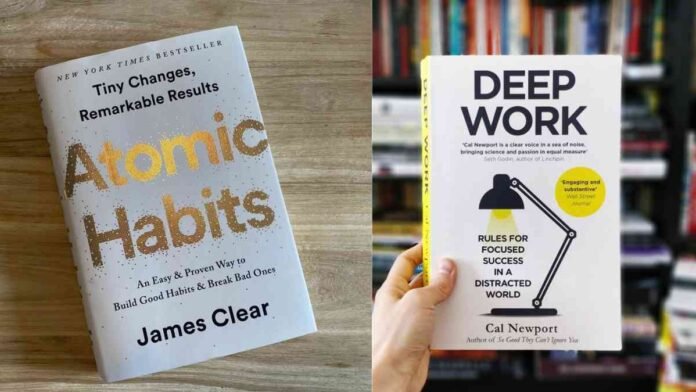Maintaining productivity might be difficult in the fast-paced world of today. The correct techniques can make all the difference, whether your goal is to maximize your time, handle personal projects, or perform well at work. Books that aren’t fiction are a goldmine of knowledge and useful suggestions for increasing productivity. In their search for better productivity, many people turn to non fiction books for advice, strategies, and motivation. These five excellent books will boost your motivation, efficiency, and productivity in both your personal and professional life.
- “Atomic Habits” by James Clear
“Atomic Habits” delves into the science of habit formation and provides a thorough manual for forming positive habits and breaking negative ones. According to Clear, over time, tiny, gradual adjustments—atomic habits—can result in big gains. He offers doable tactics to make routines appealing, simple, and fulfilling so they become ingrained. Anyone who wants to increase their daily routines and overall productivity should read this book.
Key Takeaways:
Pay attention to small steps that add up to large outcomes.
Understand the cue, craving, reaction, and reward in the habit loop.
The “Two-Minute Rule” can help you establish new habits more quickly. - “Deep Work: Rules for Focused Success in a Distracted World” by Cal Newport
“Deep Work” by Cal Newport highlights the significance of uninterrupted, concentrated effort for attaining optimal productivity and significant outcomes. Deep work, according to Newport, is necessary to become truly excellent in any subject and to master complex tasks. He provides helpful guidance on how to reduce outside distractions, establish a deep work schedule, and foster a deep work culture.
Key Takeaways:
Schedule uninterrupted serious work sessions.
To increase focus, embrace dullness.
Give high-value tasks that demand significant concentration first priority. - “The 7 Habits of Highly Effective People” by Stephen R. Covey
“The 7 Habits of Highly Effective People” by Stephen R. Covey is a timeless classic that describes a principle-centered strategy for both personal and professional success. Long-term success and productivity can be attained through a comprehensive framework offered by Covey’s habits, which include everything from being proactive to sharpening the saw. Each habit promotes the one before it, producing a compounding effect that increases total efficacy.
Key Takeaways:
Be proactive and accept responsibility for your actions.
To set clear goals, start with the end in mind.
To better manage your time, prioritize important chores above urgent ones. - “Getting Things Done: The Art of Stress-Free Productivity” by David Allen
David Allen’s “Getting Things Done” (GTD) system is an innovative approach to task management and productivity. According to Allen’s method, all tasks and ideas must be recorded, clarified into manageable steps, and arranged methodically, progress must be reflected upon, and tasks must be completed with confidence. By offering a clear framework for managing responsibilities and maintaining focus on what really matters, GTD helps people feel less stressed.
Key Takeaways:
To clear your mind, write down everything that needs to be addressed.
Prioritize your tasks and divide them into manageable steps.
To keep organized, review and update your to-do list on a regular basis. - “Essentialism: The Disciplined Pursuit of Less” by Greg McKeown
“Essentialism” emphasizes the value of putting everything else aside and concentrating on what is genuinely vital. According to McKeown, people can be more productive and satisfied if they focus on fewer, more significant things. This book is about making conscious decisions and declining obligations that are not necessary in order to make room for more significant and consequential tasks.
Key Takeaways:
To get the most impact, decide what is important and concentrate on it.
Saying no to unimportant obligations and responsibilities is a skill.
Distractions should be removed to provide room for in-depth work.
Conclusion
These five non-fiction books provide insightful analysis and useful productivity-boosting techniques. These books offer the motivation and resources you need to reach your objectives, whether they be to improve your habits, focus intently, handle chores more skillfully, or simplify your life. Their tenets can help you live a more satisfying life and increase productivity in your regular activities.



